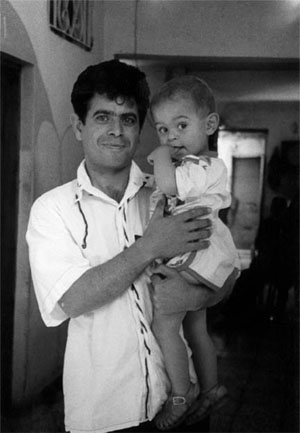
Jamal Ronani and son. 'Askar Camp, Nablus, July 1998.
|
 Jamal Ronani and son. 'Askar Camp, Nablus, July 1998. |
| Umm Muhammad Jamal Ronani, Mu'askar camp, July 3:
|
|
The next day, a Friday, Dr Said takes me to visit Mu'askar camp, about two kilometers along the road from Nablus to Amman. My travel note book describes (Mu'askar) as having "a depressed air. There's a difference between it and Boulata -- houses are more dilapidated, streets are dirtier. The people here seem more mixed -- many are from cities rather than villages, and there's a bedouin 'hayy' (quarter) as well." The urban/rural status hierarchy that was so strong in Palestine (with urbanites considered more 'civilized') became reversed over time in refugee camps, where villagers generally did better educationally and occupationally than poor urban refugees. Here, in Mu'askar camp, Dr Said takes me to the home of an UNRWA school-teacher who has promised to take me to people whose homes were destroyed. The school-teacher's home is spacious and has many chairs (always a sign of status). The walls are adorned with photos of the teacher himself and decorative nationalist insignia. Dr Said and the teacher discuss the latest political 'developments'. The teacher takes no trouble to hide his Resistance group affiliation from me. He says that homes in this camp were not blown up but sealed -- another type of punishment.
The home we visit is poorer than any so far. It's not a house, in fact, but a small room at the end of a long dark corridor piled with building materials. Five or six other rooms open off the corridor. A young man, Jamal, puts me a chair in the corridor because there's no space in the room that he, his pregnant wife and little boy share with his mother and two unmarried sisters. Umm Muhammad doesn't want to record, and only does so under |
pressure from Jamal. The recording is a poor one because Umm Muhammad's shyness arouses too many helpful interventions from the audience. But it's valuable in expressing the sense that older, uneducated refugee women have of knowing nothing, of being unqualified to speak. It's also interesting that she warms up when speaking of the arrest of her son and the punitive closing of her home. He was only 16 years old when arrested. It was before the Intifada. After the son was imprisoned, the IDF came at night and turned the family out of their house. They had nowhere to go, so they built a tin shack with an earth floor, and stayed there for five years. Rain got into everything. Abu Muhammad got sick in the chest and died.
This family is from Lydd. Jamal says that there's a committee for Lydd in the camp but it is weak. Umm Muhammad says that the only one of her sons who finished school is Jamal. He taught himself to use a computer. The prisoner son works now as a mechanic. He seems to have got no compensation for being in prison, no training. Umm Muhmammad Ronani speaks:"I'm from Lydd. (noise) I don't remember much because I don't read. I was young when we left, still a girl. The Jews came, they occupied the land, and kicked us out. I've forgotten...They told us to get out. [You came straight to Mu'asker?] Yes, straight away to Nablus, under the olive trees. Everybody was sitting under the trees. They were sitting in small shelters made of tin. Later they brought tents and put them in Mu'asker camp and started moving people to it. They moved us. First tents, then they built us houses. [Who built them?] The Agency. The Agency built for people, each family a house..." |
[Husniyya Abdel Qader] [Salim and 'Arabiya Shawamra] Copyright©2005 |
|